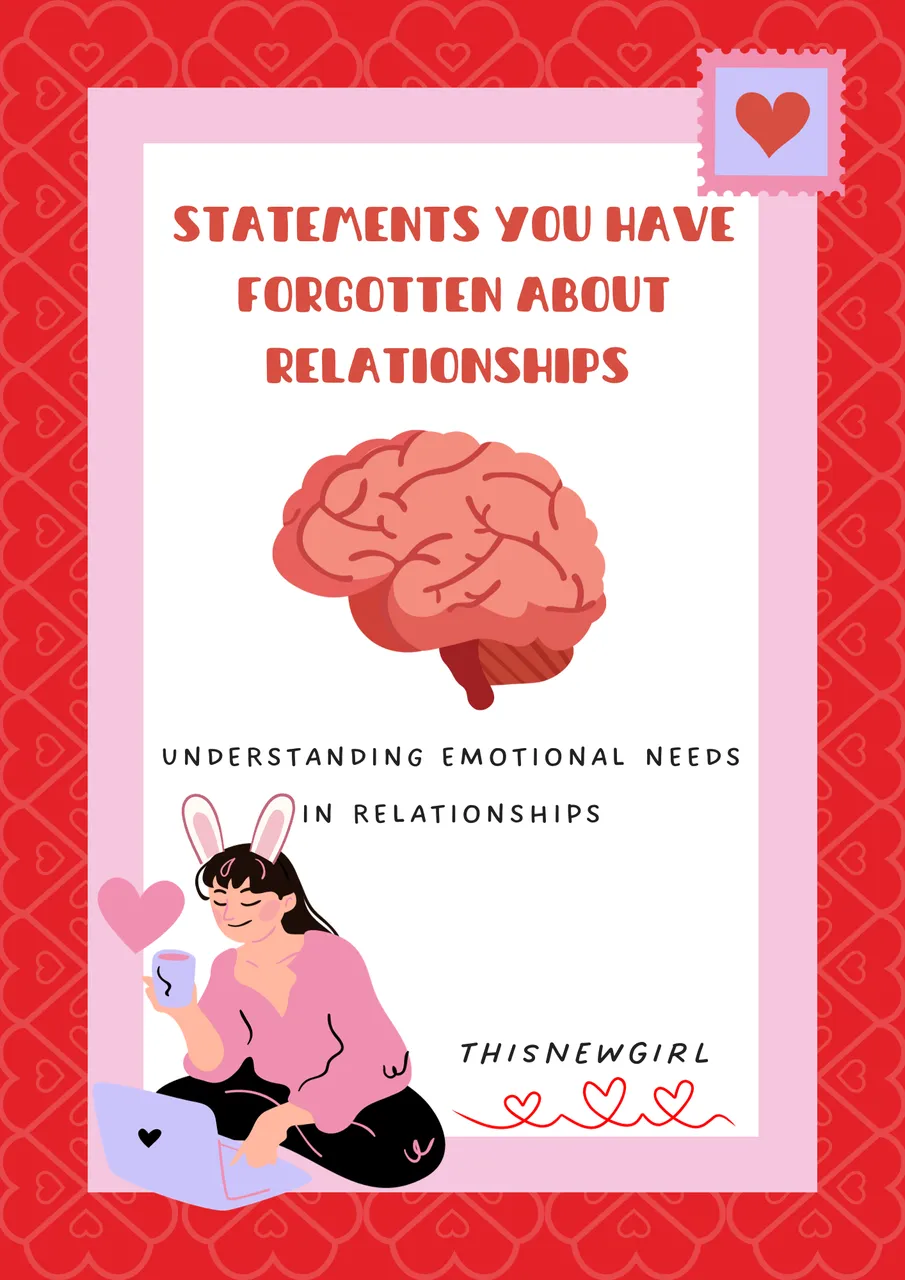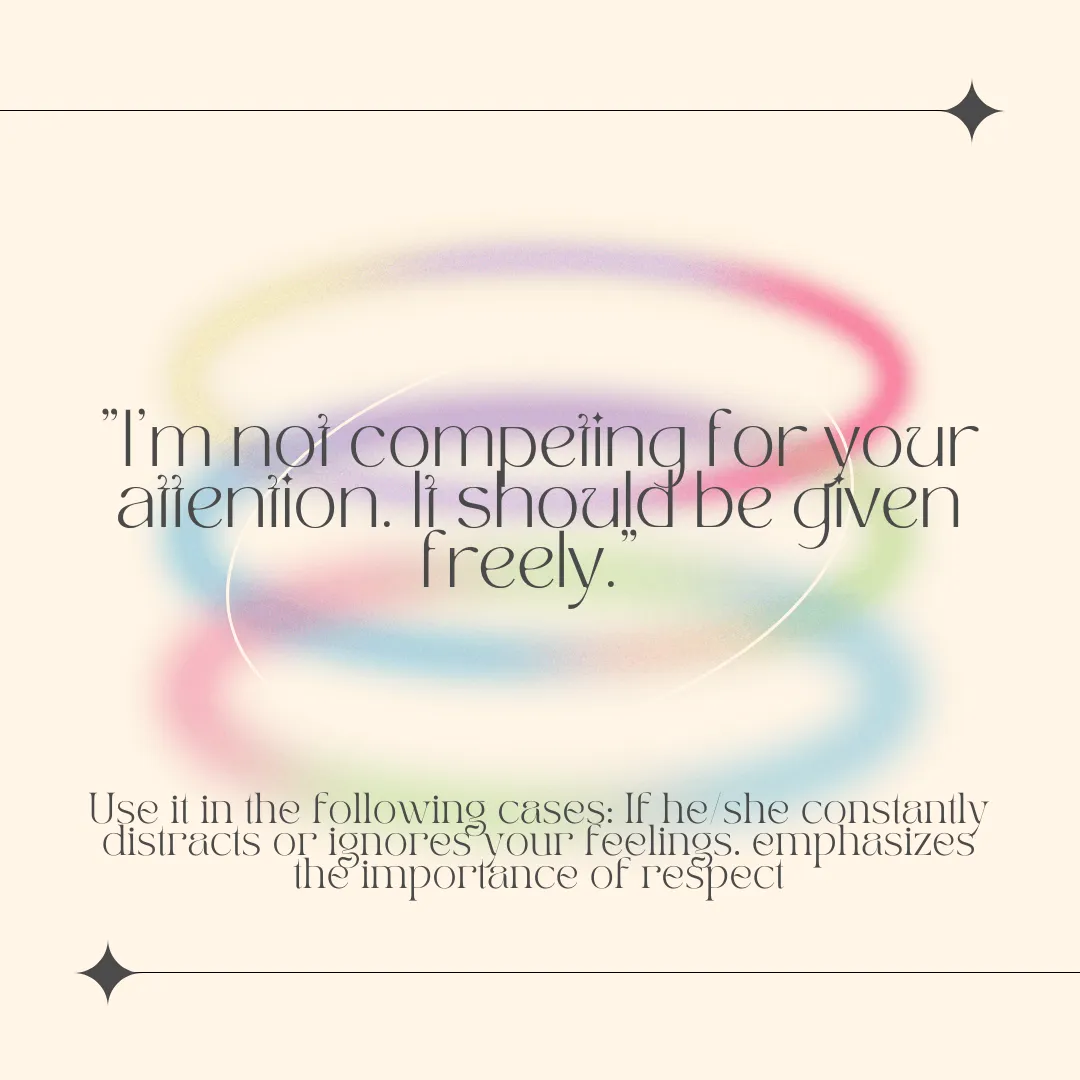
As we navigate the intricate web of human relationships, certain fundamental truths often slip through the cracks of our consciousness. Rediscovering these forgotten statements can be akin to finding the compass that guides us through the labyrinth of human psychology. In the realm of relationships, the phrase "i wont compete for your attention, it should be freely given" encapsulates a powerful yet overlooked concept. In this article, we embark on a journey to revisit these forgotten but significant aspects of relationships, shedding light on the nuances that pave the path to understanding human behavior.
Mientras navegamos por la intrincada red de las relaciones humanas, ciertas verdades fundamentales a menudo se cuelan por las grietas de nuestra conciencia. Redescubrir estas afirmaciones olvidadas puede ser como encontrar la brújula que nos guía por el laberinto de la psicología humana. En el ámbito de las relaciones, la frase "no voy a competir por tu atención, sino que debo dártela gratuitamente" encierra un concepto poderoso pero ignorado. En este artículo, nos embarcamos en un viaje para revisar estos aspectos olvidados pero significativos de las relaciones, arrojando luz sobre los matices que allanan el camino para comprender el comportamiento humano.
The Impact of Attention in Relationships
In the tapestry of relationships, attention serves as a fundamental thread that weaves connections and nurtures intimacy. When we recognize the intrinsic value of attention, we acknowledge its ability to validate, support, and strengthen the bonds between individuals. It is not merely about being in the same physical space, but rather about being fully present, actively listening, and demonstrating genuine interest in the other person's thoughts, emotions, and experiences.
The impact of attention reverberates through the dynamics of relationships, shaping the quality of interactions and fostering a deep sense of connection. When attention is freely given, it embodies a sense of respect, appreciation, and affirmation, laying the groundwork for a nurturing and fulfilling relationship. This acknowledgment of the significance of attention lays the foundation for reciprocity, emotional resonance, and an environment where both individuals feel valued and understood.
Attention becomes an expression of love, empathy, and empathy, transcending mere presence to encompass a profound acknowledgment of the other person's worth and significance. It holds the power to uplift, reassure, and empower, creating an emotional sanctuary where both individuals feel seen, heard, and cherished. The impact of attention extends beyond the surface level, delving into the intricate layers of human psychology, where the exchange of attention becomes a language of emotional connection and affirmation.
El impacto de la atención en las relaciones
En el tapiz de las relaciones, la atención es un hilo fundamental que teje conexiones y nutre la intimidad. Cuando reconocemos el valor intrínseco de la atención, reconocemos su capacidad para validar, apoyar y fortalecer los vínculos entre las personas. No se trata simplemente de estar en el mismo espacio físico, sino de estar plenamente presente, escuchar activamente y demostrar un interés genuino por los pensamientos, las emociones y las experiencias de la otra persona.
El impacto de la atención repercute en la dinámica de las relaciones, da forma a la calidad de las interacciones y fomenta un profundo sentido de la conexión. Cuando la atención se presta libremente, encarna un sentimiento de respeto, aprecio y afirmación, sentando las bases para una relación enriquecedora y satisfactoria. Este reconocimiento de la importancia de la atención sienta las bases de la reciprocidad, la resonancia emocional y un entorno en el que ambas personas se sienten valoradas y comprendidas.
La atención se convierte en una expresión de amor, empatía y compasión, que trasciende la mera presencia para abarcar un profundo reconocimiento del valor y la importancia de la otra persona. Tiene el poder de elevar, tranquilizar y empoderar, creando un santuario emocional en el que ambos individuos se sienten vistos, escuchados y apreciados. El impacto de la atención va más allá del nivel superficial y se adentra en las intrincadas capas de la psicología humana, donde el intercambio de atención se convierte en un lenguaje de conexión emocional y afirmación.

The Principle of Reciprocity
At the heart of healthy relationships lies the principle of reciprocity, where the exchange of attention becomes a reciprocal dance of give and take. When attention is freely given, it sets the stage for a harmonious interplay of acknowledging, supporting, and uplifting each other. Reciprocity in attention fosters an environment where both individuals feel valued and prioritized, nurturing a sense of balance, equity, and mutual investment in the relationship.
The principle of reciprocity underscores the notion that attention is not a one-sided transaction but a shared currency that enriches the emotional landscape of relationships. When attention flows freely, it becomes a conduit for emotional intimacy, empathy, and understanding, creating a dynamic where both individuals actively participate in nurturing and sustaining the connection. This reciprocity in attention forms the cornerstone of a healthy, thriving relationship, where both parties feel equally seen, heard, and validated in their emotional experiences.
Reciprocity in attention cultivates a sense of partnership, collaboration, and shared responsibility in fostering a nurturing and supportive relationship. It reinforces the understanding that attention is not a finite resource to be competed for, but rather an infinite wellspring of emotional connection that can be freely accessed and replenished through mutual reciprocity. Embracing the principle of reciprocity in attention paves the way for a relationship where both individuals feel valued, cherished, and deeply connected on an emotional level, creating a bond that withstands the tests of time and adversity.
El principio de reciprocidad
En el corazón de las relaciones sanas se encuentra el principio de reciprocidad, donde el intercambio de atención se convierte en una danza recíproca de dar y recibir. Cuando la atención se presta libremente, se prepara el terreno para una interacción armoniosa de reconocimiento, apoyo y estímulo mutuo. La reciprocidad en la atención fomenta un entorno en el que ambos individuos se sienten valorados y priorizados, alimentando un sentido de equilibrio, equidad e inversión mutua en la relación.
El principio de reciprocidad subraya la noción de que la atención no es una transacción unilateral, sino una moneda compartida que enriquece el paisaje emocional de las relaciones. Cuando la atención fluye libremente, se convierte en un conducto para la intimidad emocional, la empatía y la comprensión, creando una dinámica en la que ambos individuos participan activamente en alimentar y mantener la conexión. Esta reciprocidad en la atención constituye la piedra angular de una relación sana y próspera, en la que ambas partes se sienten igualmente vistas, escuchadas y validadas en sus experiencias emocionales.
La reciprocidad en la atención cultiva un sentido de asociación, colaboración y responsabilidad compartida en el fomento de una relación nutritiva y de apoyo. Refuerza la comprensión de que la atención no es un recurso finito por el que haya que competir, sino un manantial infinito de conexión emocional al que se puede acceder libremente y que se puede reponer mediante la reciprocidad mutua. Adoptar el principio de reciprocidad en la atención allana el camino para una relación en la que ambos individuos se sienten valorados, apreciados y profundamente conectados a nivel emocional, creando un vínculo que resiste las pruebas del tiempo y la adversidad.
Understanding Emotional Needs in Relationships
Central to the fabric of relationships are the emotional needs that underpin the intricate dance of human connection. When attention is freely given, it becomes a vehicle for addressing and fulfilling these emotional needs, creating a nurturing environment where both individuals feel emotionally supported and validated in their experiences. Understanding the emotional needs of oneself and the other person forms the bedrock of a relationship that thrives on empathy, compassion, and mutual understanding.
Attention serves as a conduit for meeting emotional needs, whether it be the need for validation, reassurance, empathy, or simply the affirmation of being seen and understood. When attention is freely given, it becomes a gesture of emotional attunement, signaling a deep understanding of the other person's emotional landscape and a willingness to actively engage with their needs. This empathic exchange of attention forms the cornerstone of a relationship that fosters emotional resilience, intimacy, and a deep sense of emotional security.
By understanding and addressing each other's emotional needs, individuals in a relationship create a space where vulnerability is embraced, emotional authenticity is celebrated, and a profound sense of trust and intimacy is nurtured. Attention, when channeled towards meeting emotional needs, becomes a powerful catalyst for strengthening the emotional bond between individuals, fostering an environment where both parties feel supported, understood, and valued in their unique emotional journeys.
Entender las necesidades emocionales en las relaciones
En el tejido de las relaciones son fundamentales las necesidades emocionales que sustentan la intrincada danza de la conexión humana. Cuando la atención se presta libremente, se convierte en un vehículo para abordar y satisfacer estas necesidades emocionales, creando un entorno enriquecedor en el que ambos individuos se sienten emocionalmente apoyados y validados en sus experiencias. Comprender las necesidades emocionales de uno mismo y de la otra persona constituye la base de una relación que se nutre de la empatía, la compasión y la comprensión mutua.
La atención sirve de conducto para satisfacer las necesidades emocionales, ya sea la necesidad de validación, reafirmación, empatía o simplemente la afirmación de ser visto y comprendido. Cuando la atención se presta libremente, se convierte en un gesto de sintonía emocional, que indica una profunda comprensión del paisaje emocional de la otra persona y la voluntad de comprometerse activamente con sus necesidades. Este intercambio empático de atención constituye la piedra angular de una relación que fomenta la resiliencia emocional, la intimidad y un profundo sentimiento de seguridad emocional.
Al comprender y atender las necesidades emocionales del otro, los individuos de una relación crean un espacio en el que se acepta la vulnerabilidad, se celebra la autenticidad emocional y se alimenta un profundo sentimiento de confianza e intimidad. La atención, cuando se canaliza hacia la satisfacción de las necesidades emocionales, se convierte en un poderoso catalizador para fortalecer el vínculo emocional entre las personas, fomentando un entorno en el que ambas partes se sienten apoyadas, comprendidas y valoradas en sus viajes emocionales únicos.
As you can see, interpersonal relationships go far beyond a simple "I like you" and the topic is much more extensive than I have managed to write now, so I will divide it into three parts, as always thanks for reading!
it is important to educate ourselves in psychology and understand our own brain, after all thanks to it we function, psychology is nothing more than a book, a manual about ourselves and how we react to stimuli, when we go through life without knowing these things we can find ourselves stuck in a continuous loop where we repeat unpleasant experiences.
Como pueden ver, las relaciones interpersonales van mucho mas alla de un simple "me gustas" y el tema es mucho mas extenso de lo que he logrado escribir ahora, asi que lo dividire en tres partes, como siempre gracias por leer!
es importante educarnos todos en temas de psycologia y comprender nuestro propio cerebro, despues de todos gracias a el funcionamos, la psicologia no es mas que un libro un manual sobre nosotros mismos y como reaccionamos a los estimulos, cuando vamos por la vida sin saber estas cosas podemos encontrarnos estancados en un loop continuo donde repetimos vivencias no muy gratas.
Si te ha gustado este blog dejame tu like, no te cuesta nada y a mi me ayuda un monton !
If you liked this blog leave a like, it doesn't cost you anything and it helps me a lot !
follow me !